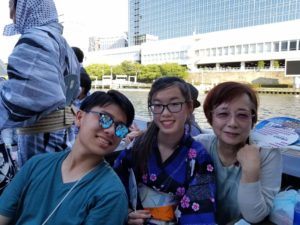
Those of us who were born in the United States might not spend much time thinking about American citizenship. After all, it came with our birth certificates.
For those born outside of the country, however, attaining citizenship can be a complex process.
What does it mean to be a U.S. citizen? Citizens, unlike other residents, have the right to vote, run for office, and hold a U.S. passport. One’s citizenship status can also affect their tax burdens and ability to hold some government jobs. Every person born within the borders of the U.S. automatically becomes a citizen (known as “birthright” citizenship), but adult residents who hold green cards—a document that allows an immigrant to live and work permanently in the United States—may also apply to “naturalize” as U.S. citizens. According to the U.S. Census Bureau’s American Community Survey, about 21.9 million current American residents are naturalized citizens, making up 49.3 percent of immigrants in the United States and 6.7 percent of the total population.
Sue Chen, mother of LWHS math teacher Ernie Chen, received assistance in navigating the naturalization process from her employer, Boeing. The airplane manufacter prized Chen— a former mathematics major who immigrated from Taiwan in 1963— enough to sponsor her green card and citizenship applications. “There wasn’t much trouble,” recalled Chen. Boeing handled most of the paperwork, and she easily met the requirements for green card holders to naturalize: residing in the United States for five years; reading, writing, and speaking English; understanding U.S. civics; and possessing “good moral character.”
Chen’s path to English fluency was a rocky one, but it was crucial to the all-English green card and citizenship applications. “At [college,] I was afraid. I didn’t speak English very well, so I avoided talking to people,” recounted Chen. By the time she applied for a green card, she “had three years in the United States, so I was able to navigate [the application process].”
Not everyone has that advantage. About half of foreign-born residents do not speak English fluently, according to a 2016 Pew Research study. Even among those who have lived in the United States for over 20 years, the rate of fluency only rises slightly, to 55 percent. Christine Hoang (mother of Maddy Nakada ’15, Yoshi Nakada ’19, and Franny Nakada ’22), an immigration lawyer who primarily serves female asylum-seekers from Central America and Southeast Asia, said that her “clients have no fluency. None.” Reading and writing English can pose an even greater barrier than speaking it. “It’s rare that I find a client who went to high school… [some of my clients] are mostly illiterate in their own language,” Hoang said.
Hoang has also witnessed the importance of English fluency firsthand while volunteering at naturalization fairs, events that prepare non-citizens for the naturalization process. “The first screening we would do was a basic English-language test, because we wouldn’t want to put them through the whole process of applying for naturalization if ultimately they weren’t going to pass.”
For English language learners, the civics test often incentivizes memorization of answers instead of actual education about United States government and history, according to Hoang. “Honestly, I don’t think a lot of people understand what they’re learning,” Hoang said. “They just want to get the right answers.” (Sidebar: See if you can pass the test!)
The difficulty of the civics and English literacy tests has deep nativist historical roots. The Naturalization Act of 1906 introduced the English-language literacy test to the naturalization process amidst a virulent anti-immigrant movement, and allowed immigration officials to conduct civics tests. At first, local employees of the Bureau of Naturalization could choose the questions, and some officers intentionally quizzed prospective citizens on obscure factoids. In fact, the Bureau had to ban arcane and trick questions in the 1930s, after officials started asking questions like “How high is the Bunker Hill Monument?” in an effort to trip up applicants. Polling has consistently found that most Americans adults—about 64 percent, according to a recent survey by the Woodrow Wilson National Fellowship Foundation— would fail the civics test. The United States does not have an official language, so on paper, there is no reason to prefer English literacy and proficiency over that of any other language. Both requirements, however, persist to this day.
Furthermore, “everything is taking five times as long” in the Trump administration’s immigration services, Hoang said. The process can be wildly inconsistent depending on where one lives. According to the U.S. Citizenship and Immigration Service’s website, their Cleveland office may take as little as four months to process a naturalization application, and their Atlanta office could take nearly two years. In San Francisco, they estimate a 12.5-15.5 month wait. The average processing time, which sat below six months until the 2017 fiscal year, now sits at 10.2 months—a marked increase since Trump took office.
For many, the process may not be worthwhile. Lu Jiacong, Chen’s husband, gained his green card in 2017. As the spouse of an American citizen, he was eligible for an Immediate Relative Immigrant Visa, the most common type of visa. Between immediate relatives (236,526) and other family members (211,641), family made up 84 percent of the 533,557 total immigrant visas granted by the U.S. in the 2018 fiscal year. Same-sex couples have only been eligible for Immediate Relative visas since 2013.
By 2020, Lu will be eligible to apply for American citizenship (spouses of U.S citizens only have to wait three years before applying for naturalization). Though he said that “it’s easy to live in San Francisco,” he remains unsure whether he will try to naturalize in the future. “If I were an active political person, I would think it’s better to have citizenship [in order to vote]. But I’m not,” Lu said. Instead, the realities of international travel to see his family in China weigh heavily on him. “If I want to go back to China, it’s much easier to use a Chinese passport.” China does not permit its citizens to also hold American citizenship, and unlike Chinese citizens, Americans must obtain a travel visa from the Chinese embassy to travel legally in China.
On February 22, the United States Citizenship and Immigration Service (USCIS), which oversees the naturalization process, unveiled a revised mission statement. Among the changes, the agency removed the word “citizenship” from its mission entirely, eliminating a reference to “promoting an awareness and understanding of citizenship” and shortening the phrase “immigration and citizenship benefits” to “immigration benefits.” In their place, the mission statement now mentions “protecting Americans, securing the homeland, and honoring our values.” It remains to be seen whether, and how, the shift in philosophy will lead to any shift in practice.







